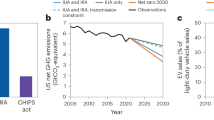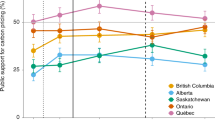Abstract
Successful implementation of climate policies requires public acceptability. Fuel prices may impact policy support. Here we examine this relationship by analysing retail gasoline prices and individual-level survey data from Italian and US metropolitan areas. We do not find a significant association between gasoline prices and support for funding renewable energy research, regulating CO2 emissions or requiring companies to pay carbon taxes. We do find that support for phasing out combustion-engine cars decreases when gasoline prices increase. In exploratory analyses, we find that lower-income and more liberal individuals reduce their support more as gasoline prices rise. Using an additional US nationally representative survey dataset, we find that higher gasoline prices are associated with lower support for environmental protection when it comes at the risk of curving economic growth. The negative effects of gasoline prices on climate policy support do not seem driven by reduced environmental concerns.
This is a preview of subscription content, access via your institution
Access options
Access Nature and 54 other Nature Portfolio journals
Get Nature+, our best-value online-access subscription
$29.99 / 30 days
cancel any time
Subscribe to this journal
Receive 12 digital issues and online access to articles
$119.00 per year
only $9.92 per issue
Buy this article
- Purchase on Springer Link
- Instant access to full article PDF
Prices may be subject to local taxes which are calculated during checkout


Similar content being viewed by others
Data availability
The ICAPP data analysed in the current study are not currently publicly available due to ongoing unpublished analyses but are available from the authors upon reasonable request. The retail gasoline price data we used can be retrieved from the US Energy Information Administration (https://www.eia.gov/petroleum/gasdiesel) for the United States and for Italy from the Italian Ministry of Environment and Energy security (https://dgsaie.mise.gov.it/open-data). US state and regional employment data are available from the US Bureau of Labor Statistics (https://download.bls.gov/pub/time.series/la/la.data.2.AllStatesU and https://download.bls.gov/pub/time.series/la/la.data.60.Metro). GDP data are available from the US Bureau of Economic Analysis (https://apps.bea.gov/regional/histdata/index.cfm). Italian employment and quarterly GDP data from the National Statistics Institute (http://dati.istat.it/Index.aspx?QueryId=12578&lang=en, http://dati.istat.it/Index.aspx?QueryId=25308&lang=en). The Gallup survey data we analysed are retrievable from the Gallup organization with an appropriate license. Data from Climate Change in the American Mind: National Survey Data on Public Opinion (2008–2022) is available at: https://osf.io/k9sfc.
Code availability
The replication code used to produce the figures and analyses in this study is available from the corresponding author on reasonable request.
References
Costa-Campi, M. T., del Rio, P. & Trujillo-Baute, E. Trade-offs in energy and environmental policy. Energy Policy 104, 415–418 (2017).
Binder, C. C. Inflation expectations and the price at the pump. J. Macroecon. 58, 1–18 (2018).
Hastings, J. S. & Shapiro, J. M. Fungibility and consumer choice: evidence from commodity price shocks. Q. J. Econ. 128, 1449–1498 (2013).
Atil, A., Lahiani, A. & Nguyen, D. K. Asymmetric and nonlinear pass-through of crude oil prices to gasoline and natural gas prices. Energy Policy 65, 567–573 (2014).
Borenstein, S., Cameron, A. C. & Gilbert, R. Do gasoline prices respond asymmetrically to crude oil price changes? Q. J. Econ. 112, 305–339 (1997).
US EIA Factors Affecting Gasoline Prices (US EIA, 2023); https://www.eia.gov/energyexplained/gasoline/factors-affecting-gasoline-prices.php
Gelman, M. et al. The response of consumer spending to changes in gasoline prices. Am. Econ. J. Macroecon. 15, 129–160 (2023).
Binder, C. & Makridis, C. Stuck in the seventies: gas prices and consumer sentiment. Rev. Econ. Stat. 104, 293–305 (2022).
Edelstein, P. & Kilian, L. How sensitive are consumer expenditures to retail energy prices? J. Monetary Econ. 56, 766–779 (2009).
Bergquist, P., Konisky, D. M. & Kotcher, J. Energy policy and public opinion: patterns, trends and future directions. Prog. Energy 2, 032003 (2020).
Stokes, L. C. & Warshaw, C. Renewable energy policy design and framing influence public support in the United States. Nat. Energy 2, 17107 (2017).
Aklin, M. Do high electricity bills undermine public support for renewables? Evidence from the European Union. Energy Policy 156, 112400 (2021).
Duijndam, S. & van Beukering, P. Understanding public concern about climate change in Europe, 2008–2017: the influence of economic factors and right-wing populism. Clim. Policy 21, 353–367 (2021).
Shum, R. Y. Effects of economic recession and local weather on climate change attitudes. Clim. Policy 12, 38–49 (2012).
Brulle, R. J., Carmichael, J. & Jenkins, J. C. Shifting public opinion on climate change: an empirical assessment of factors influencing concern over climate change in the U.S., 2002–2010. Climatic Change 114, 169–188 (2012).
Bez, C., Bosetti, V., Colantone, I. & Zanardi, M. Exposure to international trade lowers green voting and worsens environmental attitudes. Nat. Clim. Change 13, 1131–1135 (2023).
Dunlap, R. E. & Mertig, A. G. Global concern for the environment: is affluence a prerequisite? J. Soc. Issues 51, 121–137 (1995).
Kachi, A., Bernauer, T. & Gampfer, R. Climate policy in hard times: are the pessimists right? Ecol. Econ. 114, 227–241 (2015).
Mildenberger, M. & Leiserowitz, A. Public opinion on climate change: Is there an economy–environment tradeoff? Environ. Polit. 26, 801–824 (2017).
Drews, S., Antal, M. & van den Bergh, J. C. J. M. Challenges in assessing public opinion on economic growth versus environment: considering European and US data. Ecol. Econ. 146, 265–272 (2018).
Sisco, M. et al. Examining evidence for the Finite Pool of Worry and Finite Pool of Attention hypotheses. Glob. Environ. Change https://doi.org/10.1016/j.gloenvcha.2022.102622 (2023).
Bergquist, M., Nilsson, A., Harring, N. & Jagers, S. C. Meta-analyses of fifteen determinants of public opinion about climate change taxes and laws. Nat. Clim. Change 12, 235–240 (2022).
Dechezleprêtre, A. et al. Fighting Climate Change: International Attitudes Toward Climate Policies (National Bureau of Economic Research, 2022); https://www.nber.org/papers/w30265
Povitkina, M., Jagers, S. C., Matti, S. & Martinsson, J. Why are carbon taxes unfair? Disentangling public perceptions of fairness. Glob. Environ. Change 70, 102356 (2021).
Goldberg, M. H., Gustafson, A., Ballew, M. T., Rosenthal, S. A. & Leiserowitz, A. Identifying the most important predictors of support for climate policy in the United States. Behav. Public Policy 5, 480–502 (2021).
Hoffmann, R., Muttarak, R., Peisker, J. & Stanig, P. Climate change experiences raise environmental concerns and promote Green voting. Nat. Clim. Change 12, 148–155 (2022).
Ejelöv, E. & Nilsson, A. Individual factors influencing acceptability for environmental policies: a review and research agenda. Sustainability 12, 2404 (2020).
Gallup Poll Social Series (Gallup Organization, 2005–2018); https://www.gallup.com/175307/gallup-poll-social-series-methodology.aspx
Benjamini, Y. & Hochberg, Y. Controlling the false discovery rate: a practical and powerful approach to multiple testing. J. R. Stat. Soc. B 57, 289–300 (1995).
Li, S., Linn, J. & Muehlegger, E. Gasoline taxes and consumer behavior. Am. Econ. J. Econ. Policy 6, 302–342 (2014).
Rivers, N. & Schaufele, B. Salience of carbon taxes in the gasoline market. J. Environ. Econ. Manage. 74, 23–36 (2015).
Kahneman, D. Reference points, anchors, norms, and mixed feelings. Organ. Behav. Hum. Decis. Process. 51, 296–312 (1992).
Brückmann, G. & Bernauer, T. What drives public support for policies to enhance electric vehicle adoption? Environ. Res. Lett. 15, 094002 (2020).
Beresteanu, A. & Li, S. Gasoline prices, government support, and the demand for hybrid vehicles in the United States. Int Econ. Rev. 52, 161–182 (2011).
Bushnell, J. B., Muehlegger, E. & Rapson, D. S. Energy Prices and Electric Vehicle Adoption (NBER, 2022); https://www.nber.org/papers/w29842
Busse, M. R., Knittel, C. R. & Zettelmeyer, F. Are consumers myopic? Evidence from new and used car purchases. Am. Econ. Rev. 103, 220–256 (2013).
Klier, T. & Linn, J. The price of gasoline and new vehicle fuel economy: evidence from monthly sales data. Am. Econ. J. Econ. Policy 2, 134–153 (2010).
Li, S., Timmins, C. & von Haefen, R. H. How do gasoline prices affect fleet fuel economy? Am. Econ. J. Econ. Policy 1, 113–137 (2009).
Colantone, I., Lonardo, L. D., Margalit, Y. & Percoco, M. The political consequences of green policies: evidence from Italy. Am. Polit. Sci. Rev. https://doi.org/10.1017/S0003055423000308 (2023).
Douenne, T. & Fabre, A. Yellow vests, pessimistic beliefs, and carbon tax aversion. Am. Econ. J. Econ. Policy 14, 81–110 (2022).
Yale Program on Climate Change Communication (YPCCC) & George Mason University Center for Climate Change Communication (Mason 4C). Climate Change in the American Mind: National Survey Data on Public Opinion (2008-2017) (YPCCC and Mason 4C, 2019).
Ballew, M. T. et al. Climate change in the American mind: data, tools, and trends. Environ. Sci. Policy Sustain. Dev. 61, 4–18 (2019).
Cameron, A. C. & Miller, D. L. A practitioner’s guide to cluster-robust inference. J. Hum. Resour. 50, 317–372 (2015).
Acknowledgements
This work was supported by the European Research Council under the European Community’s Programme ‘Ideas’—call identifier: ERC-2013-StG/ERC grant agreement number 336703—project RISICO ‘Risk and uncertainty in developing and implementing climate change policies’, by the cooperative agreement National Science Foundation (NSF) SES-1463122 awarded to the Center for Research on Environmental Decisions, NSF grant, SES-2030800 ‘RAPID: Public Responses to Personal and Societal Risk: Attitudes and Behaviour on COVID-19 and Global Change’ and by generous support from the Global Thinking Foundation and GLC Charitable Trust. Additionally, this research is part of a project supported by the European Union’s Horizon 2020 research and innovation programme under the Marie Skłodowska-Curie grant agreement number 870245.
Author information
Authors and Affiliations
Contributions
M.R.S. developed and oversaw the ICAPP survey data collection. M.R.S. and I.H.C. jointly conceptualized the study design; developed the analysis; collected, analysed and interpreted the data and wrote and edited the paper.
Corresponding author
Ethics declarations
Competing interests
The authors declare no competing interests.
Peer review
Peer review information
Nature Energy thanks the anonymous reviewers for their contribution to the peer review of this work.
Additional information
Publisher’s note Springer Nature remains neutral with regard to jurisdictional claims in published maps and institutional affiliations.
Supplementary information
Supplementary Information
Supplementary Figs. 1–7 and Tables 1–15.
Rights and permissions
Springer Nature or its licensor (e.g. a society or other partner) holds exclusive rights to this article under a publishing agreement with the author(s) or other rightsholder(s); author self-archiving of the accepted manuscript version of this article is solely governed by the terms of such publishing agreement and applicable law.
About this article
Cite this article
Hernandez Carballo, I., Sisco, M.R. Examining the effects of gasoline prices on public support for climate policies. Nat Energy 9, 219–227 (2024). https://doi.org/10.1038/s41560-024-01449-2
Received:
Accepted:
Published:
Issue Date:
DOI: https://doi.org/10.1038/s41560-024-01449-2



